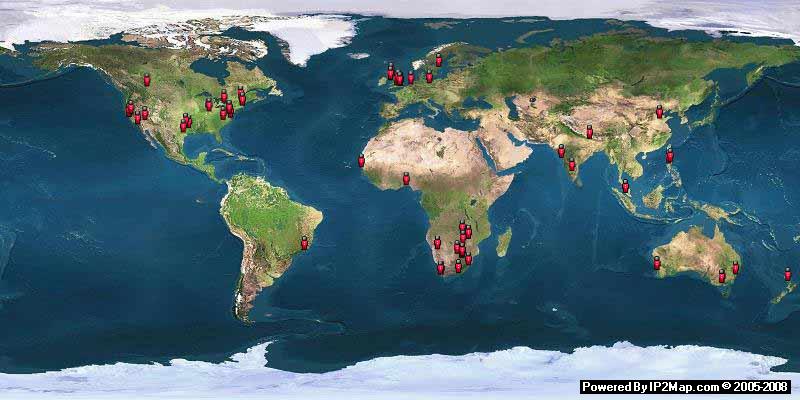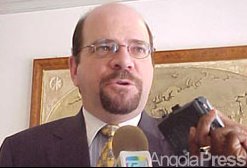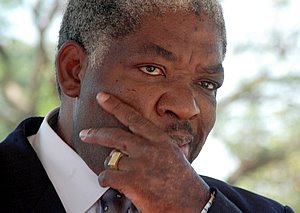There must be more to democracy than elections
Dianna Games
THE holding of multiparty elections is generally held to be a defining element in moving African states from a postcolonial era of failed socialism, political looting and endemic civil war into a modern, globalised, technocratic world.
But it is clear that simply staging a poll will not, of itself, achieve the ambitions for Africa outlined by the likes of the New Partnership for Africa’s Development (Nepad).
Last week’s Nigerian elections highlighted the issue. A Nigerian acquaintance asked me how it was that, after eight years of government failure to improve basic services, the inept ruling party was voted back in 28 of 36 states. Adding insult to injury has been the rampant siphoning off of development money into personal accounts of the political class. The majority voted for the very people who had robbed them.
It seems one of the key regulating functions of democracy — calling misrule to account — is not working.
There are various obvious reasons for this, voter ignorance, vote-rigging, and intimidation of the mass sectarian vote being among them.
The April 14 election of Nigeria’s state governors and legislators was characterised by allegations of rigging and inefficiencies that led observers to question the results in at least 10 states.
In some places, gangs hijacked ballot boxes and there were significant discrepancies between results announced at polling stations and later ballot collation at local government level.
As Zimbabwe has shown, the rigging of an election, and destabilisation of the political environment, can start long before polling day, and long before foreign election observers hit town. Local authorities and chiefs are bought off well in advance, and they in turn ensure compliance through a combination of fear and reward. Accountability is notable by its absence.
A lot is spoken about an “African democracy” in academic forums. This alludes to a democracy that takes into account the continent’s particular characteristics and accommodates factors absent from successful democracies in other regions. But surely chaotic polling, stolen elections and a perversion of the golden principle of accountability are not among these unique elements?
What are the ingredients of so-called mature democracies that make them models that the likes of Nepad aspire to, yet are missing from the equation in places such as Nigeria and Zimbabwe?
Obvious factors are better organisation and tighter, more scrupulous election controls. But, as suggested earlier, democracy is more than just an election, and perhaps we put too much store by actual polling days. What about the much longer intervening period, when politicians are supposed to fulfil their promises?
Indeed, elections can be viewed as a mirror of the political environment in a country. If the overall democratic ethos is improved, it’s just possible we will get better elections.
Effective political opposition is notably lacking in many African democracies. Having strong, critical voices raised as part of the continuing political debate within a society can only sharpen government effectiveness and accountability.
Unfortunately, in many African countries, opposition politicians are not seen as patriotic, concerned citizens who have the betterment of society as their goal. Rather, they are perceived to be enemies of the state; or avaricious individuals out to deprive incumbents of the spoils of power.
In many African states, opposition parties are barely tolerated, while in others they are openly persecuted. When Zimbabwean opposition leader Morgan Tsvangirai was beaten by government forces, the president blithely said he had it coming to him.
Demonising the opposition often has as a corollary: the blurring of the line between state and ruling party. The voting masses can easily get confused about nationality and nationalism, which serves incumbent governments well. Once the ruling parties have reinstalled themselves by fair means or foul, they carry on as before, citing the mandate they received at the polls.
Of course, Africa has to start somewhere in the democratising process, and an election is the logical place. And, indeed, conditions in African states struggling to emerge from the ravages of decades of exploitation and political experiment are very different to those in the developed world — so the talk of a special type of “African democracy” is probably apposite.
But this new form of democracy surely cannot leave out accountability, tolerate corruption by leaders and sideline dissenting voices. These are integral to the rule “of the people, by the people, for the people”.
‖Games is director of Africa @ Work, an African consulting company.
PLEASE KINDLY SUBMIT YOUR VIEWS TO mufarostig@gmail.com
VISITORS' MAP AS AT 21/05/2009

What exactly is the way forward in Zimbabwe?? Please Zimbos lets discuss! hosted by zimfinalpush.
Chat about what's on your mind. More about public chats.
ADVERTISERS PLEASE HELP US!
PLEASE KINDLY CLICK ON THE "COUNTERS" AND YOU WILL GET TO A PAGE WHERE YOU WILL SEE THE DETAILS OF THE VIEWERS OF THESE 15 BLOG-SITES! THE WHOLE WORLD VIEWS "ZIMFINALPUSH"! PLEASE KINDLY SUPPORT THIS EFFORT AND ADVERTISE! CONTACT mufarostig@yahoo.co.uk FOR YOUR SUPPORT! ZIMFINALPUSH STAFF!

Powered byIP2Location.com
|
MP3 music download website, eMusic

| Click here to unsubscribe | Privacy Policy | Terms of Use |
© 2006 eMusic.com, Inc. All rights reserved. iPod® is a registered trademark of Apple Computer, Inc. Apple is not a partner or sponsor of eMusic.com, Inc. |
|
NB: THIS IS NOT THE HOME PAGE!
GoStats
Technorati
THE US AMBASSADOR(Christopher W Dell !)

"A breath of air!"
PRES LEVY MWANAWASA OF ZAMBIA!

"Another breath of fresh air!"
Previous Postings Archived Monthly!
-
▼
2007
(122)
- ► January 2007 (10)
- ► February 2007 (3)
- ► March 2007 (26)
-
▼
April 2007
(65)
- "Zimbabwe's two Dictatorships!" by Cde M Gwisai.
- "MUGABE: RADICAL OR RE-ACTIONARY?"
- "DEFENCE OF MUGABE MISGUIDED!" by Mary Revesai
- Dear Cde Thabo Mbeki,
- MUGABE: DID HE REALLY RESIGN?
- "THIS SO-CALLED 'QUIET DIPLOMACY' HOGWASH!"
- THE DISHONOURING OF AFRICANS!
- Last act in Zimbabwe?
- RADICAL ON SWRADIOAFRICA 4th APRIL, 2007.
- MBEKI'S COMMENTS ON ZIM SITUATION!
- MBEKI USES DIVERSIONARY TACTICS TO ESCAPE FROM REA...
- UPDATE FROM THE ZIM CSO FORUM!
- "MUGABE WILL NOT LISTEN TO MBEKI!"
- TSVANGIRAI WARNS MBEKI OVER "WORLD CUP" GAMES!
- MORE ON THE MUSLIM PERPECTIVE!
- "HOW CAN SADC LEADERS CONDEMN ONE WHO IS LIKE THEM?"
- "MBEKI ACTUALLY SUPPORTS ZANU-PF!"
- "THE GREAT BETRAYAL IN IRAQ!"
- "Darfur disgraces the African Union!"
- "TIME RUNNING OUT FOR DICTATORS!"
- Zimbabwean human rights lawyer Alec Muchadehama on...
- MBEKI'S "QUIET DIPLOMACY DEFENDED!"
- "ZIMBABWE CRUMBLES!" says student of AFRICAN STUDIES!
- A "MUST READ" FOR ALL SERIOUS ANALYSTS!
- THE MOST STUPID VIEW OF THE RECENT EVENTS IN ZIMBA...
- MUTUMWA MAWERE ASKS, "ZIMBABWE: WHAT NEXT??"
- "MUGABE IS A SAVAGE!" Former Defence Minister Enos...
- "ZIMBABWE'S ROAD TO DICTATORSHIP" by Itayi Garande.
- MESSAGES TO THE STATE PRESIDENT OF SOUTH AFRICA!
- WHAT SHOULD WE CONCENTRATE ON AT THIS PARTICULAR P...
- "ROBERT MUGABE HAS NOWHERE TO HIDE!"
- WELCOME BRO TANONOKA WHANDE!
- ARTICLES, BOOKS ETC FOR THE SINCERE "THINK-TANKS"!
- THE INTERVIEW WITH THE MDC PRESIDENT!
- 18th APRIL: WHAT IS THERE TO CELEBRATE?
- US must continue piling pressure on Mugabe !"
- "THE FUNERAL PARLOUR THAT HAS BECOME ZIMBABWE!"
- "GET OFF YOUR BLOODY COMFORT ZONE!" Zimgreats Editor!
- "THEZIMBABWETIMES" EDITOR ASKS: "WILL MBEKI RISE T...
- PROF MUTAMBARA QUESTIONS ROBERT MATIBILI'S "WAR LE...
- CDE T J WHANDE: "SADC MUST ABANDON CONSPIRACY OF S...
- ROBERT: TERRORIST OR LIBERATOR?
- SIKANYISO NDLOVU TALKING "NONSENSE!"
- AN EX-ZNA MILITARY OFFICER ON HOW ELECTIONS ARE RI...
- Those who forget history get tricked by Mugabe!
- "Suddenly people are starting to wake up......!"
- "STATE BRUTALITY MUST END!" Trevor Ncube
- JOHN ITESHI OF NIGERIA CORRECTED!
- JOHN ITESHI DEFENDS HIS PERSPECTIVE!
- ONLY A VERY DULL IMBECILE SHOULD BELIEVE THIS!
- THE FULL SUBMISSION ON THE RIGGING OF THE ZIM ELEC...
- ZIM YOUTHS COMPLETING THE REVOLUTION!
- "A MAD MAN OCCUPIES STATE HOUSE!" ZIMONLINE READER!
- ZIMBABWEANS MUST DEDICATE THEMSELVES TO NEW STRUGG...
- "WILL AFRICA EVER RID ITSELF OF DICTATORS?"
- "THE 'MARRIAGE OF CONVENIENCE' BETWEEN ZANU-PF AND...
- "MUGABE SHATTERED DREAM OF ALL AFRICANS!"
- JAMBANJA THE ONLY WAY FORWARD!
- ABIGAIL MPISA'S PERSPECTIVE OF MUGABE, TEKERE !
- "THERE MUST BE MORE TO DEMOCRACY THAN JUST ELECTIO...
- "MDC MUST CALL OFF SANCTIONS!"
- CDE MUNYARADZI GWISAI INTERVIEWED IN NEW ZEALAND!
- ZIMBABWE'S LONELY FIGHT FOR JUSTICE!
- "You Can't Kill Journalism!" WILF MBANGA.
- Press walks a thin line in Zimbabwe!
- ► September 2007 (2)
-
►
2009
(2)
- ► March 2009 (2)
Monday, April 23, 2007
Subscribe to:
Post Comments (Atom)







No comments:
Post a Comment